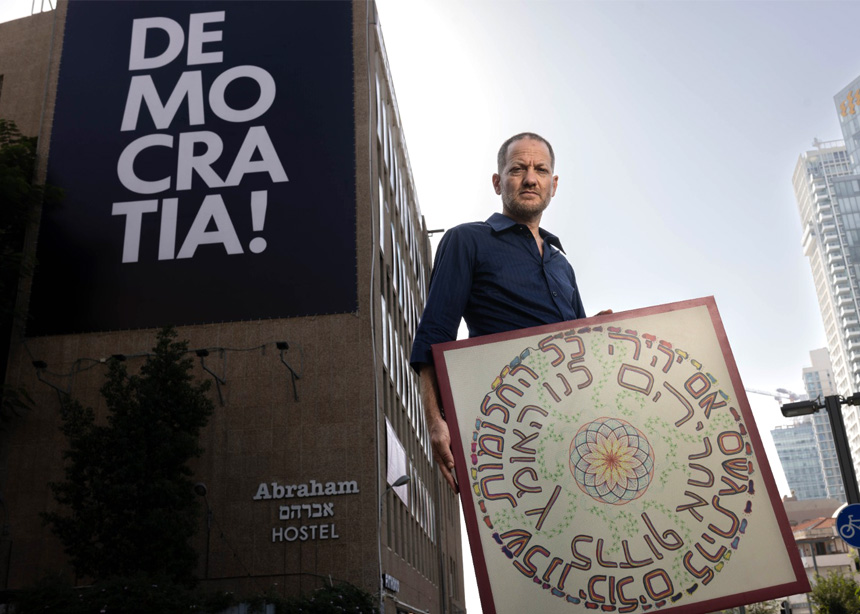Maoz Inon is an Israeli Jewish social entrepreneur and peace advocate. During a February online event—Part I of the Peace & Possibility events—he shared the story of his parents being murdered by Hamas and his family’s astonishing journey to peace.
The following excerpts are from an online event with Inon that Canadian Mennonite convened in collaboration with Anabaptist World, Christian Courier and the Mennonite Church Canada Palestine-Israel Network.
Inon started by sharing a vision he saw on the third night after his parents, Bilha and Yakovi Inon, were murdered at their home in Netiv Ha’asara, Israel.
— · · · —
I would like to open with a vision. . . . I woke up at night, my entire body was aching with pain like I have never experienced before. I woke up crying, and through my tears I could see [all] humanity, all mankind was crying. We were all crying—Israelis and Palestinians, between the river and the sea, and in the entire world—we were crying.
And then I could see the tears falling on our body and our body was wounded, wounded from the war, from so many wars we’ve been waging on each other. And our tears washed our bodies and healed the wounds.
It was a miracle that our bodies became whole again. . . . And then I looked on the ground, and the ground was red from blood. . . . And then our tears, after healing our bodies, washed the ground and they cured the ground. And then I could see through my tears, the beautiful ground and I could see the path of peace.
— · · · —
It was the second morning of the Shiva [the Jewish ritual period of mourning] when my brother said . . . “I want from our personal tragedy and community tragedy to send a universal message. And I want our message to be [that] we are not calling for revenge for our murdered parents.
“We just want to end the cycle of blood, the cycle of war.”
And this is the message we started crying, and shouting and speaking from that moment.
— · · · —
As the Shiva ended, after a week of crying, suddenly my mind cleared and became very sharp. And I told myself, Maoz you have a mission, and your mission is to convince yourself and to convince everyone else that the future is going to be a better future. . . .
I have learned many lessons [since then], most of them from Palestinians. And the support we received as a family from Palestinians within Israel, in the West Bank, and the in Arab world for our message was so powerful. And they gave us so much hope in human beings. It made us very, very strong.
In Israel, there are 120 parliament members. They only parliament members who called us were Palestinians.
— · · · —
[Referring to Palestinian peace advocate Hamze Awawde who appeared with Inon’s brother on the BBC:] I told myself, I want to be a great person like Hamze. I want to be able to forgive.
So I said, I’m forgiving. I’m forgiving Hamas, I’m forgiving the Israeli government.
I reduce and erase all the anger within me and I’m just concentrating on building the future. . . .
— · · · —
We are talking about two different stories, two different narratives—the Palestinian and the Israeli. And those narratives split in the holy books, with the different chosen sons, Isaac and Ishmael. And then the stories split and . . . the gap is getting wider as we get closer to the present with the Israeli Jewish Zionist movement and the Palestinian national movement and all the wars we have been waging. . . .
But there is a miracle; it’s a true miracle. We meet. We meet in the future. We see the same future. So many Israeli and Palestinians share the same future—a future that is based on equality, based on justice, based on reconciliation, based on security for everyone, based on “you shall not [seek] revenge.”
Now we have to project this future through our minds, through our souls, and to be able to model it.
This is something we have forgotten in the Middle East and maybe in the Western world—to use our political imagination to dream and believe in a better future. . . . Now we are starting [to] model it, and building the steps and the roadmap to reach this future.
Watch the entire interview here. on the Anabaptist World YouTube channel.









Leave a Reply
You must be logged in to post a comment.